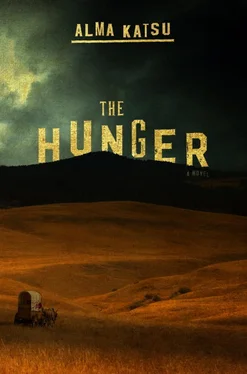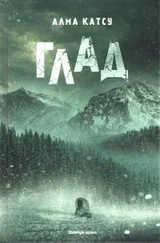Алма Катсу - The Hunger
Здесь есть возможность читать онлайн «Алма Катсу - The Hunger» весь текст электронной книги совершенно бесплатно (целиком полную версию без сокращений). В некоторых случаях можно слушать аудио, скачать через торрент в формате fb2 и присутствует краткое содержание. Город: New York, Год выпуска: 2018, ISBN: 2018, Издательство: G. P. Putnam's Sons, Жанр: Ужасы и Мистика, Историческая проза, на английском языке. Описание произведения, (предисловие) а так же отзывы посетителей доступны на портале библиотеки ЛибКат.
- Название:The Hunger
- Автор:
- Издательство:G. P. Putnam's Sons
- Жанр:
- Год:2018
- Город:New York
- ISBN:978-0-735-21251-0
- Рейтинг книги:4 / 5. Голосов: 1
-
Избранное:Добавить в избранное
- Отзывы:
-
Ваша оценка:
- 80
- 1
- 2
- 3
- 4
- 5
The Hunger: краткое содержание, описание и аннотация
Предлагаем к чтению аннотацию, описание, краткое содержание или предисловие (зависит от того, что написал сам автор книги «The Hunger»). Если вы не нашли необходимую информацию о книге — напишите в комментариях, мы постараемся отыскать её.
The Hunger — читать онлайн бесплатно полную книгу (весь текст) целиком
Ниже представлен текст книги, разбитый по страницам. Система сохранения места последней прочитанной страницы, позволяет с удобством читать онлайн бесплатно книгу «The Hunger», без необходимости каждый раз заново искать на чём Вы остановились. Поставьте закладку, и сможете в любой момент перейти на страницу, на которой закончили чтение.
Интервал:
Закладка:
I’ve saved my favorite new acquaintance from the Springfield contingent for last. Charles Stanton, a bachelor traveling alone in his own Conestoga wagon, is unlike most all the other single men in the party—either hired hands or near-penniless drifters—and I think for this reason we quickly became friends. We were both raised by ministers (though unlike my county preacher father, his grandfather is a prominent Anglican minister, so famous that even I’ve heard of him) and bear similar scars to prove it. I was flattered when he told me that he’d read the articles I wrote for the Washington Globe on that revivalist fraud Uriah Putney.
For a quiet man he has lived a life of extreme color: He was born in Massachusetts and apprenticed to a lawyer in Virginia before running off to fight under General Sam Houston in the battle of San Jacinto. Seeing that he fought in the war for Texas independence even though he has no ties to that territory, he might be either a romantic or idealist. From what I saw of him, I’d say he’s a little of both—which means he’s doomed to an unhappy life, I’m afraid. He has hinted at some terrible event that drove him from Massachusetts but refuses to speak of it. He isn’t sure what he would do once he reaches California, another sign of the restless spirit that keeps him on the move.
A strange mix of souls and, despite the sometimes politicking and intrigues, I will be reluctant to leave them all when I separate from the wagon train tomorrow morning. I decided to commit to that scheme I wrote to you about, joining a small party of men without families on mule and horseback to make better time. I could not convince Stanton to leave with me and I suspect it’s because he feels he can be helpful to the larger party, which can be fractious. I am in some ways relieved—at least they’ll have one sensible man in the group—and in other ways anxious to leave the group before they have successfully decided on a leader.
Fort Laramie is an honest-to-goodness frontier fort, just as the newspapers describe them. You get the sense of being at the very edge of civilization, that beyond the fort’s adobe walls is a land nearly untouched by the white man, where nature reigns. I’ve been told that this year alone, several thousand wagons rolled through this checkpoint, and by all estimates that number will soar next year, barring war with Mexico or hostilities with the Indians. The fort shows all the signs of prosperity: In addition to the small garrison stationed here, there is a good-sized trading post, blacksmith’s shop, livery stable, and a bakery. There are several two-story houses inside the adobe walls, presumably for the fort’s owners, families, and staff.
Even though this wagon party is among the last of the season, on our arrival the fort was bustling. A knot of trappers unloaded their packhorses in front of the trading post, the men dirty and unkempt in their old buckskins and coonskin caps. Children ran through the street, shrieking with laughter. A half-dozen Indians mounted on fantastically colorful Appaloosa and paint horses rode slowly through the dusty streets, men dressed in Western garb accented with the feathers and beads of their people lounged in the sun outside the stables.
Unsurprisingly, word spread quickly of a bar at the trading post. But I was most interested in a hot meal. I am already so tired of my own cooking. I had barely settled at one of the scarred tables in the dining hall with a tin plate awash with runny stew when I noticed a man dressed like a trapper or mountain man in the characteristic well-worn buckskins, his hair long and white and his wrinkled face as tanned as leather. His name was Lionel Farnsworth. Unlike everyone else, he was headed east, not west. What’s more, he was traveling alone, a dangerous proposition in such sparsely populated territory. He told me he’d already journeyed once to Oregon and twice to California and knew the trails better than nearly anyone.
Farnsworth’s opinion of the Hastings Cutoff—the route Donner plans to lead the party through—was quite dismal. In Farnsworth’s opinion, the terrain was too rough for wagons and inhospitable to livestock. Donner happened to be with me and he was not pleased to hear that Farnsworth thought the route a waste of time. He proceeded to try to persuade Farnsworth of the error of his thinking, explaining that Hastings himself was going to meet them at Fort Bridger and had promised to guide them all the way to California, but the old man was not swayed. He told Donner in no uncertain terms they should keep to the old route. But he would have had better luck trying to talk a teapot into singing an aria.
In fact, when Farnsworth found out that I planned to take the same route (albeit without wagons and a much smaller party) he tried to talk me out of it, too. After much prodding, it came out that the harsh terrain wasn’t the only, or even the main, reason for his hatred of the route. He admitted that he’d seen one other group of Indians, the Anawai, in his travels near Truckee Lake, but he warned me not to meet with them. When I told him I’d never heard of the Anawai, he said that wasn’t surprising as the tribe was small and thought to be quite isolated. He claimed that they were particularly savage, and in fact engaged in a terrible tradition, which he had seen with his own eyes: human sacrifice.
I was stunned. Human sacrifice is extremely rare among the plains tribes. Ancient cultures to the south, the Mayans and Aztecs, are known to have practiced ritual human sacrifice, but from what I’ve read it’s virtually unheard of north of the Rio Grande. I asked him to describe what he’d witnessed exactly. For obvious reasons, I assumed he had simply misinterpreted what he’d seen.
He told me he’d seen about a dozen Anawai warriors take one of their braves into the woods. The brave fought to get away, but they held him tight. They took him far from their camp and tied him to a tree, binding him hand and foot, and then left him to his fate even though he had screamed out after them. Farnsworth thought that he had been begging them to let him go.
A profoundly disturbing scene, no doubt. I could understand why Farnsworth had been spooked. Still, it didn’t sound like a sacrifice ritual to me. From my readings on the topic, I knew that those chosen to be sacrificed often consider it an honor and go willingly to the altar.
I told Farnsworth that what he’d seen sounded more like punishment. It was extremely likely this brave had done something to get himself banished from the tribe. But Farnsworth insisted that that was not the case. He claimed to know why they did it, too: The Anawai were afraid of “the demon that lives out by Truckee Lake” and were making a sacrifice so that it would leave the rest of them alone.
Farnsworth knew nothing more about the folklore but had heard stories this past year of Indians disappearing from villages not far from where the Anawai lived, usually the sick and the old and children, plucked from their beds or gone out for firewood or berries, never to return. Of course such folktales recur in almost every culture, but I was strangely moved, perhaps because of the poor Nystrom boy—he, too, plucked from his bed, never to return.
Farnsworth had been reluctant to tell me his story, afraid I’d think he was insane. He only relented after I assured him that I did want to know, that this was the very reason I was headed into Indian Territory, to investigate their strange and mythic beliefs and try to correlate them to some observable reality. He could tell that I was set on heading to Truckee Lake, but he begged me to convince Donner and the others not to go that way, too.
I fear, however, that I have had little sway over Donner thus far, and will not in this. As for myself, I can only admit that Farnsworth’s warnings have had the opposite of their intended effect. I can think of nothing now but of the chance to meet this singular tribe and of his tale of the spirit—the demon—of Truckee Lake.
Читать дальшеИнтервал:
Закладка:
Похожие книги на «The Hunger»
Представляем Вашему вниманию похожие книги на «The Hunger» списком для выбора. Мы отобрали схожую по названию и смыслу литературу в надежде предоставить читателям больше вариантов отыскать новые, интересные, ещё непрочитанные произведения.
Обсуждение, отзывы о книге «The Hunger» и просто собственные мнения читателей. Оставьте ваши комментарии, напишите, что Вы думаете о произведении, его смысле или главных героях. Укажите что конкретно понравилось, а что нет, и почему Вы так считаете.







![Алма Катсу - Голод [litres]](/books/432580/alma-katsu-golod-litres-thumb.webp)




